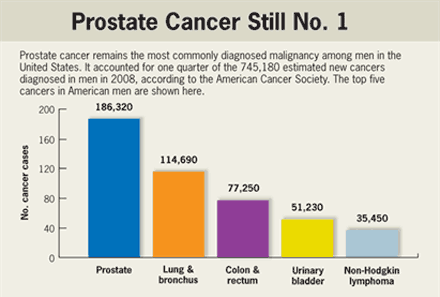Mayo Clinic identifies a key cellular pathway in prostate cancer
Mayo Clinic researchers have shed light on a new mechanism by which prostate cancer develops in men. Central to development of nearly all prostate cancer cases are malfunctions in the androgen receptor - the cellular component that binds to male hormones. The research team has shown that SPOP, a protein that is most frequently mutated in human prostate cancers, is a key regulator of androgen receptor activity that prevents uncontrolled growth of cells in the prostate and thus helps prevent cancer. The findings appear in the journal Cell Reports.
“By uncovering this new and important pathway of androgen receptor destruction, we may one day be able to develop more effective treatments for a substantial proportion of prostate cancer patients who have developed resistance to standard antiandrogen therapy,” says Haojie Huang, Ph.D., Mayo Clinic biochemist and senior author of the paper.
SPOP mutations have been detected in approximately 15 percent of prostate cancer cases. In addition, it has been shown that in about 35 percent of prostate cancers, the SPOP protein is expressed at abnormally low levels. Despite its prevalence in prostate cancer, it was not known whether or how SPOP defects contributed to tumor development. What the research team discovered is that SPOP is an enzyme that selectively destroys androgen receptor protein. Failure to do so due to alterations in SPOP results in overabundance of androgen receptor, a master regulator of prostate cancer cell growth.
The Mayo Clinic research team made four major discoveries:
The antiandrogen receptor is a bona fide degradation substrate of SPOP.
Androgen receptor splicing variants are resistant to SPOP-mediated degradation.
Prostate cancer-associated SPOP mutants cannot bind to and promote androgen receptor degradation.
Androgens antagonize, but antiandrogens promote SPOP-mediated degradation of androgen receptor.
Prostate Cancer Background
 Prostate cancer is the second most common cause of cancer in men and the second leading cause of cancer death in American men, with over 913,000 new cases and over 261,000 deaths worldwide each year. Because of the widespread disability and death that prostate cancer causes, finding new strategies to develop better treatments is an important public health goal.
Prostate cancer is the second most common cause of cancer in men and the second leading cause of cancer death in American men, with over 913,000 new cases and over 261,000 deaths worldwide each year. Because of the widespread disability and death that prostate cancer causes, finding new strategies to develop better treatments is an important public health goal.
Androgen receptor is essential for normal prostate cell growth and survival. It is also important for initiation and progression of prostate cancer. Androgen deprivation therapy, including chemical castration and/or antiandrogen therapy, is the mainstay for treating advanced/disseminated prostate cancer. However, tumors almost always reoccur two to three years after initial response and relapse into a disease called castration-resistant prostate cancer. Development of this therapy-resistant symptom is related to a persistent activation of androgen receptor.
###
Co-authors of the article include Jian An, Ph.D.; Chenji Wang, Ph.D.; Yibin Deng, Ph.D.; and Long Yu, M.D., Ph.D., all of Mayo Clinic. Their research was supported by the National Institutes of Health and the Mayo Clinic Cancer Center. Dr. Huang is a member of the Mayo Clinic Cancer Center and the departments of Biochemistry and Molecular Biology, and Urology.
About Mayo Clinic
Recognizing 150 years of serving humanity in 2014, Mayo Clinic is a nonprofit worldwide leader in medical care, research and education for people from all walks of life.
###
Robert Nellis
.(JavaScript must be enabled to view this email address)
507-284-5005
Mayo Clinic